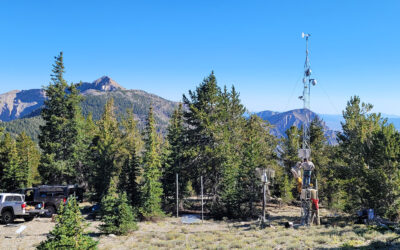Created in 2013 by the Governor’s Office of Economic Development, the Knowledge Fund spurs research, innovation, and commercialization in Nevada.
Thanks to support from the Knowledge Fund, researchers across the Silver State have been busy cultivating the intellectual property that will continue the diversification of our economy for years to come. DRI researchers have leveraged over $11 million in state support over the last five years for projects focusing on public health, unmanned aircraft systems (UAS) development, and commercialization of new technologies.
Applied Innovation Center (AIC)
Inception: March 2014
Total funds awarded (all years): $6M
Status: Current project
End Date: June 30, 2019
The AIC leverages the intellectual capital of DRI faculty and 60 years of environmental science research in four main areas of applied research: climate, weather, and energy nexus; Internet of Things (IoT) and remote sensing; engineering and design; and life sciences and informatics. From these four core areas, the AIC builds hardware and software for industry, leverages these platforms for sponsored projects, creates jobs, and helps build innovative companies in Nevada.
The Healthy Nevada Project:
Developed by the Renown Institute for Health Innovation (Renown IHI), this is one of the first community-based population health studies in the nation. A world-class team of researchers and physicians from DRI and the Renown Health healthcare network are working together to use genetics, environmental data, and individual health information to create a healthier Nevada.
PHASE ONE: Open to northern Nevada residents, the comprehensive pilot phase of the study offered community members the opportunity to volunteer for research and gain access to their individual genetic information free of charge on September 15, 2016.
- The pilot phase of the study enrolled 10,000 participants in less than 48 hours.
- Subsequent DNA sample collection from each participant was completed in just 60 working days.
- DNA genotyping was done with personal genetics company 23andMe.
- Participants in the pilot phase of the study range from ages 18 to 90 years old and come from 135 zip codes in northern Nevada.
PHASE TWO: For the second phase of this project, research teams will have greater depth and quality of DNA data thanks to a public-private partnership with Helix, a personal genomics company that uses Next Generation Sequencing (NGS) technology and operates one of the world’s largest, most highly accredited exome sequencing labs.
Utilizing Helix’s proprietary NGS technology and uniquely personalized suite of DNA-powered products, research teams are offering an additional 40,000 Nevadans the opportunity to have their DNA sequenced and participate in the next phase of the study which opened for enrollment on March 15th, 2018.
In Phase Two, Renown IHI will begin providing advanced calcium score screenings to pilot phase participants at higher risk for cardiovascular disease. This will allow researchers to examine the link between genetics and calcium buildup in the heart. Additionally, based on pilot phase data, researchers have seen increased use of regional healthcare correlated with fluctuations in air quality and so-called “bad air events” such as wildfires and atmospheric inversions. Renown IHI will also evaluate possible links between genetics and increased susceptibility to respiratory ailments.
In the years ahead, Renown IHI aspires to offer genetic testing through the Healthy Nevada Project to every Nevadan interested in learning more about their health and genetic profile and drive positive health outcomes statewide. Simultaneously, the Healthy Nevada Project will expand the state’s access to cutting-edge clinical trials and foster new connections with biotechnology and pharmaceutical companies.
“Nevada is leading the country in growth and innovation. But sadly, we continue to rank among the worst regarding health at 47th in the nation. Through the Healthy Nevada Project, we now have the gift of insight to make needed changes not just for ourselves and our loved ones but for Nevada.”
– Nevada Governor Brian Sandoval, The Healthy Nevada Project’s first participant
Desert Research Corporation:
Venture-Capital Funding Raised for Tu Biomics, AIC
Tu Biomics Inc., born from DRI’s expertise in microbial ecology, is an agricultural pharmaceutical company that targets industrial scale farming and its significant soil health challenges. In conjunction with DRI’s soil and molecular biology scientists, Tu Biomics is driving the development of organic antifungal chemicals as a cost-effective alternative to currently available options. DRI scientists have demonstrated the ability of Biological Control Agents (BCAs) to eliminate white rot, a fungal pathogen impacting onion and garlic crops, under laboratory conditions.
First AIC, Desert Research Corporation Spin-Out Company Launches
Predira Inc. leverages DRI’s weather intelligence platform to provide localized pest and disease forecasts for industrial scale farming through a web-based software product called ForecastView. With its companion smartphone app, FieldScout, users can input real-time data and get timely, detailed pest and disease forecasts as well as response options to mitigate significant crop loss. DRI scientists are completing software development and beta testing of ForecastView and FieldScout with some of California’s largest berry growers.
WaterStart (formerly the Nevada Center of Excellence in Water):
Inception: April 2014
Total Funds Awarded (all years): $3.7M
Status: Current Project
Project End Date: June 30, 2019
As fresh water becomes increasingly scarce, water resource management and sustainability will be vital to maintaining quality of life and economic development in communities around the world.
WaterStart is a cluster of global leaders in the implementation of water technology. Formed in 2013, WaterStart was established through a joint venture between academic, public, and private sectors to create a statewide network to deploy and test compelling, early-stage technologies that address Nevada’s greatest water management challenges. This network now includes, Nevada’s two largest drinking water utilities that serve approximately 80% of the state’s population, the largest agricultural producer, the largest employer and commercial space operator and has recently expanded to include out-of-state, as well as international drinking water utilities.
This group has collectively provided support through WaterStart’s membership program by contributing $400,000 to support technology recruitment and project development activities, opening up their facilities and infrastructure to host pilot projects, and providing more than $800,000 in additional funding to support these pilots.
Nevada and Queensland, Australia recently signed a sister state agreement, which includes $500,000 in funding for Queensland innovators to collaborate with WaterStart to improve local urban water supply systems and take their ideas to Nevada and the world. This agreement makes WaterStart truly international.
Its network of early adopters has effectively created a unique process for prioritizing, implementing, and evaluating new water technologies. This process, which is the foundation of WaterStart’s Commercialization Program, has rapidly accelerated the rate of technology deployment and provides a critical pathway for new technologies to successfully enter the U.S. water market. Waterstart and its members have:
- Developed a list of more than 60 innovation priorities.
- Assessed more than 300 technologies based on member needs.
- Evaluated more than 220 proposals from companies seeking to participate in the Commercialization Program.
- Implemented 17 projects.
- Funded nearly $1.5M to deploy and test new water technologies.
Partnership for Research to Open Markets for an Emerging Technology: Helping to Expand Unmanned Systems (PROMETHEUS)
Total Funds Awarded (all years): $491K
Status: Current Project
Project End Date: June 30, 2019
NSHE-Industry Unmanned Autonomous Systems (UAS) Collaboration Program:
This project’s purposes include developing new technologies and applications as they relate to fire science research and fire management; assessing the commercial potential of fire-UAS applications and assisting Nevada companies in targeting relevant markets; building capacity and conducting outreach to promote fire-related UAS business for our Nevada partners in the field of fire science and fire management; and seeking opportunities to conduct demonstrations, operations, and relevant supporting research.
- Consulted with three Reno-based UAS startups on strategy and market.
- Planning (Phase I) for the largest fire research project in history, Fire and Smoke Model Evaluation Experiment (FASMEE).
- Supported or submitted external funding proposals for more than $25 million.
- Development of specialized UAS payloads for air-quality monitoring and measurements for fire- smoke impacts ad public health applications.
- Known returns to industry partners and Nevada represent more than $10 for each dollar invested in this project by GOED.
Cloud Seeding:
Inception: November 2015
Total Funds Awarded (all years): $750K
Status: Past Project
End Date: June 30, 2018
DRI, in partnership with AviSight and Drone America, developed and tested UAS technologies for cloud seeding operations. This includes creating forecasts and conducting flight planning for manned and unmanned aircraft, cloud seeding using manned and unmanned systems and ground generators as well as estimating effectiveness of UAS cloud seeding operations.
The goals of the project were four-fold:
- Development of new UAS technologies for cloud seeding operations while demonstrating Nevada’s Public COA and commercial COA and 333 authority.
- Operation of UAS for cloud-seeding operations, both alone and in conjunction with ground-based generators and manned aircraft.
- Assessment of the effectiveness of unmanned cloud seeding platforms using newly-developed technology and tools.
- Assessment of the broader market potential and development of a commercialization process for UAS cloud seeding in other areas.
Highlights:
- Longest commercial UAS flight in US airspace, and DRI’s first beyond-line-of- sight (BLOS) flight.
- More than two dozen print-media and web stories by local, state, national and international media, including a feature article in Popular Science.
- Letter of collaboration to pursue cloud- seeding work in UAE with industry partners.
Unmanned Aircraft System (UAS) for Agricultural Applications – Winnemucca Farms (AA/WF):
Inception: April 2016
Total Funds Awarded (all years): $152K
Status: Past Project
Project End Date: December 31, 2017
DRI, in collaboration with AboveNV, deployed AboveNV’s Unmanned Aircraft Systems (UAS) in support of agricultural and water management of critical crop fields owned and managed by Winnemucca Farms, Inc. The project tested the applicability of UAS data to address large-scale, multi-crop agricultural needs, particularly water- related crop stress and irrigation efficiencies.
Winnemucca Farms, Inc. is one of the largest in Nevada and expressed interest in assessing UAS data products to improve farm management. UAS activities were conducted using AboveNV’s Section 333 Certificates of Waiver or Authorization (COA) and the team worked with the Nevada Institute for Autonomous Systems (NIAS) to become a NIAS Node that allowed use of the NIAS blanket COA from the FAA.
DRI and AboveNV proposed a near-term and long- term approach to utilizing UAS collected imagery to monitor irrigation management and crop health. The project focused on UAS data acquisition to identify and map agricultural crop stress that will lead to improved water use while maintaining and/or improving crop yields (project location is a portion of Winnemucca Farms’ properties). Highlights included:
- Image processing methods were further defined and UAS imagery of fields in bare soiled condition acquired. This enabled the assessment quality of elevation mapping from standard image processing techniques.
- In response to the client’s needs, the original intent of developing a Geographic Information System (GIS) database was changed to pursue a secure web-based interface that the farm manager and his staff will be able to use from a computer or handheld devices such as notebook and smart phone assisting in his crop management decisions. This exemplifies customer driven applied R&D solutions.
- Collaboration with a DRI faculty member, which resulted in the preparation of a secured website to display data acquired for Winnemucca Farms at multiple spatial scales. It includes both USGS digital elevation model data and a Landsat 8 satellite multispectral 13 image that encompasses the entire main farm fields and immediate adjacent areas with the UAS-acquired images being embedded.
- DRI personal provided training to local start-up AboveGeo on the calibration and operation of FLIR thermal cameras and how to establish ground-based calibration targets for acquisition of thermal images using UAS. This is a good example of how an applied research institution can support a local early stage company by providing vital technology and equipment know-how.


